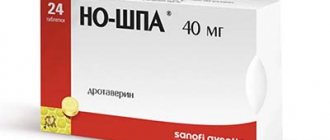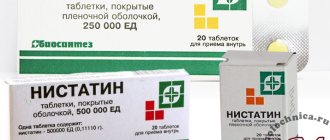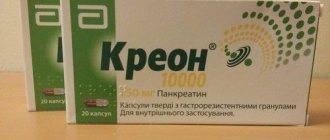Vikasol to stop menstruation is used when it is necessary to reduce heavy discharge or delay its onset. The main purpose of this drug is to reduce the amount of blood loss during menstruation. This symptom is characteristic of a number of pathological conditions. It should be understood that the medicine will not help eliminate the cause itself, but is only part of the overall treatment plan.
The hemostatic properties of this drug will help reduce the intensity of discharge, and its use can improve the general condition of the body. This occurs by relieving all the characteristic symptoms of anemia caused by regular heavy menstruation. Women note the disappearance of weakness, dizziness, and drowsiness.
The drug is an affordable medicine and is sold in pharmacies without a prescription. But its availability does not mean that you should self-medicate. There are a number of contraindications; if taken uncontrolled, there is a risk of causing various complications (reproductive function or associated with blood stagnation and increased thrombus formation). Therefore, it cannot be used without the appointment of a specialized specialist.
What effect does Vikasol have on the body?
To stop menstruation, this medicine is recommended to be used a few days before it starts or on the first day of menstruation. This is due to the characteristics of the effect on the body, the rate of absorption and the mechanism of action. Let us consider in detail what this drug is and what effects can be achieved by taking it.
Vikasol is a synthetic analogue of vitamin K, which is involved in the complex mechanism of blood clotting. The main active ingredient, sodium menadione bisulfite, has the ability to increase the amount of prothrombin and proconvertin in the body, which directly affect coagulation. A series of sequential reactions lead to the conversion of prothrombin into fibrin, which is the main component of a blood clot. It is with this effect on blood coagulation factors that the mechanism of action of Vikasol, which stops menstruation, is associated.
As a result of taking an artificial analogue of vitamin K, the process of blood clots intensifies in the body. As a result, the blood begins to clot with the formation of blood clots that are unable to leave the lumens of the capillaries. And bleeding, caused by the natural process of rejection of the surface layer of the epithelium lining the uterus, is reduced in volume. That is, with heavy periods, the desired result is achieved by increasing blood clotting. The result of taking Vikasol can be:
- significant reduction in bleeding;
- reduction of menstruation days (1 – 3 instead of 5 – 6 days);
- complete absence of menstruation, the so-called “skipped cycle”.
As reviews indicate, Vikasol during menstruation can significantly change the nature of bleeding, up to its complete absence at the appointed time. It is worth remembering the dangers associated with uncontrolled long-term use of the drug, in case of overdose or in the presence of contraindications. These include the following risks:
- reproductive dysfunction associated with hormonal disorders;
- delay of regular menstruation;
- decomposition of blood that was “left” in the uterine cavity (the process may be accompanied by an unpleasant odor, discharge, inflammatory reactions);
- thickenings on the uterine mucosa.
Such consequences are not necessary, but are possible, therefore the use of the drug without a prescription from the treating doctor, or without strict adherence to the dosage regimen is prohibited. Only a specialized specialist can decide whether taking a medicine is justified (as an independent remedy or as part of a general treatment regimen), whether the patient has serious contraindications, etc.
What is Vikasol?
Vikasol is a synthetic water-soluble preparation of vitamin K.
Participates in the metabolism of connective and bone tissue. Promotes the absorption of calcium and vitamin D by the body. It is a fat-soluble, protein-synthesizing substance. It is recommended to take the drug in case of damage to the walls of blood vessels, resorption of blood clots and prevention of their formation, to stop bleeding.
Indications for the use of the drug follow from various causes of bleeding:
- capillary;
- caused by hemorrhoids;
- in late pregnancy;
- ulcerative;
- uterine.
Prescribed for intestinal dysfunction, prolonged diarrhea and diseases associated with impaired bile outflow. Stimulates and normalizes liver function. Vikasol ensures the synthesis of acids, normalizes the functioning of the heart and lungs.
Indications and contraindications for use
Vikasol tablets are more often used in medical practice than injection solutions. This is due to the convenience of self-administration of the drug. The effect in both cases will be identical; the main active ingredient begins to act immediately after entering the body. But when taken orally, the result will appear 10 - 12 hours later than when administered intramuscularly.
Indications for use:
- heavy and prolonged bleeding caused by hypertrophy of the uterine mucosa. This symptom is characteristic of a number of pathological conditions (endometritis, endometriosis, fibroids);
- hormonal changes that lead to abnormal thickening of the endometrium (as a result of which heavier periods are observed, as the volume of rejected endometrium excreted from the body increases);
- vitamin deficiency (vitamin K deficiency) or other problems leading to blood clotting disorders;
- dysfunctional bleeding (in this case, the use of Vikasol during menstruation does not solve the problem, but is used as part of symptomatic therapy);
- problems with the contractile function of the uterus (its inability to contract leads to heavy and prolonged bleeding);
- situational use (to delay menstruation, the drug can be prescribed if you need to skip one cycle or significantly reduce the volume of discharge and shorten its duration).
In any case, self-prescription of the drug is not acceptable. Any abnormally long menstruation or bleeding outside the cycle can be a symptom of a pathology of the female reproductive system that requires specific treatment. Contraindications to the use of the drug will be:
- any blood clotting disorders associated with excessive thrombus formation (high coagulation rates, thromboembolism or tendency to it, thrombosis, hypercoagulation);
- atherosclerosis;
- with caution: during pregnancy and breastfeeding, renal and/or liver failure.
Use of the drug Vikasol for heavy menstruation
Most women in our country are illiterate in matters of gynecology and, when ailments appear, they try not to contact specialists, looking for information on the Internet. But there are no specialists on women’s forums, so it is not possible to get objective advice in this way.
Vikasol - a drug for regulating menstruation
Use of the drug Vikasol during menstruation. Methods of application and mechanism of action
Independent use of the drug to delay menstruation can provoke negative consequences, including the formation of cancer cells. That is why, if you need to delay menstruation, you should not use the drug yourself, but rather consult a specialist.
Pharmacology of the drug
If there are no malfunctions in the body, then the circulatory system operates as usual, providing vital substances to all tissues of the body. But if pathological processes are observed that affect homeostasis, then deviations in blood clotting indicators may also be observed. Blood clotting helps the body fight bleeding of various etiologies. But with various pathologies (including genetic overtones), patients may experience heavy blood loss that is not responsive to medications.
The drug Vikasol belongs to a group of drugs with hemostatic properties, which provokes blood thickening, which stops bleeding.
Vikasol, by its origin, is a synthetic analogue of natural vitamin K. And the main component of the drug is menadione sodium bisulfite.
Vikasol is available in tablet form or in the form of injection solutions.
Vikasol is close in composition to vitamin K
The principle of action of the drug. Indications and contraindications for use
The instructions indicate that after using the drug, after a short amount of time, increased synthesis of the protein prothrombin is observed in the patient’s liver. And its production provokes an increase in the prothrombin index in the blood and increased blood clotting. That is why most women take the drug Vikasol during heavy periods to reduce the amount of discharge and reduce the duration of menstruation.
The instructions indicate a list of indications for use of the drug:
- When diagnosing obstructive jaundice, in order to increase the level of vitamin K in the blood.
- If the patient has undergone surgery to remove one or more parts of the small intestine.
- The presence of inflammatory diseases or infections of the digestive system, accompanied by hemorrhage. Such diseases include dysentery.
- The presence of erosive lesions of the mucous membrane of the stomach and intestines. Inflammatory bowel disease and Crohn's disease.
- The appearance of various bleeding of unknown etiology in various body systems. Most often, Vikasol is used in gynecology and gastroenterology.
- Various hemorrhagic disorders in adults and congenital pathologies in children.
- If excessive bleeding is detected during the recovery period after surgery.
The instructions also note the presence of contraindications to the use of the drug:
- The patient has a high prothrombin index.
- The presence of varicose veins and problems with peripheral vessels.
- Hemolytic abnormalities.
- The instructions prohibit taking the drug if a large number of blood clots are detected and there is an indication for bypass surgery.
The instructions also warn about taking the drug during pregnancy. It is recommended to use the drug cautiously during lactation and for people with kidney and liver problems.
Intestinal inflammation is a direct contraindication to the use of Vikasol
Application of Vikasol in gynecology
Vikasol is a completely synthetic drug that has contraindications and side effects. Therefore, its independent administration can lead to death.
The functional properties of this medication have been used in gynecology for a long time. But Vikasol should not be taken uncontrollably during menstruation, as most women think. Since the drug has a sufficient list of contraindications.
Some experts are against this drug because:
- The use of Vikasol tablet does not give an immediate effect; with its help it is impossible to delay or stop menstruation that has already begun. The effect after taking the pill is noted only on the second day, so it is impossible for them to stop ectopic bleeding in time.
- The effect of stopping excessively heavy menstruation will only appear in case of vitamin K deficiency.
- After prolonged and uncontrolled use of Vikasol, the patient experienced a negative effect on all systems of the body.
- Even a single use of a Vikasol tablet to stop excessive menstruation leads to side effects. The situation is aggravated by the presence of concomitant diseases of the cardiovascular system.
Therefore, if there is no need to delay or forcibly stop menstruation, you should not use the drug without consulting a specialist.
The cardiovascular system suffers from the use of Vikasol
How to stop menstruation with Vikasol?
To take a drug to stop menstruation, you must first weigh all the positive and negative sides or consult a specialist. Doctors do not recommend taking pills to stop menstruation on your own, because such a drug has a very high risk of developing thrombosis.
If, after an examination, the doctor comes to the conclusion that the patient needs to take the drug to stop menstruation or bleeding, then it is necessary to calculate an individual dose.
Since the medicine is available both in tablet form and in injection form, the doctor can easily calculate the individual dose to avoid complications.
Self-prescribing a medication or taking it in excess of the norm leads to tissue swelling and the appearance of a large number of blood clots, which can cause blockage of blood vessels and death.
vrachlady.ru
Possible side effects
Like any other medicine, Vikasol may cause some side effects. If they appear, you should consult a doctor; if symptoms worsen, discontinue the drug. Side effects include:
- allergic reactions, which can manifest themselves in the form of itching, urticaria, rash, redness of the skin;
- reactions from the cardiovascular system: low blood pressure, tachycardia;
- reactions from the respiratory system: bronchospasm and/or swelling (mainly in patients with a history of asthma);
- hemolytic anemia;
- disruption of normal liver functions;
- dizziness and headaches;
- change in taste.
The drug is continued to be taken if the side effects are minor and do not threaten the general health of the patients. Otherwise, Vikasol is canceled, and other medications are chosen to stop menstruation.
Tablets and injections
The most natural chemical composition has a direct impact on the time interval required to achieve the desired effect. The phase of the most intense effect occurs 12–18 hours after taking the drug in tablet form.
https://www.youtube.com/watch?v=IkwMP5nIK4Q
Vikasol solution, produced in the form of injections, has a hemostatic effect within an hour after entering the woman’s body. Doctors say that in case of severe uterine bleeding during menstruation, the greatest effect from using the medicine can be achieved in injection form.
How to take Vikasol
Instructions for using the drug depend on the form in which it enters the body. If an immediate effect is required, intramuscular administration is selected once (1 ampoule) daily.
For heavy periods, Vikasol tablets are prescribed 0.03 g daily. This daily norm corresponds to 2 tablets, which are taken by the patient 1 piece at an equal interval of 12 hours. This scheme allows you to maintain a constant concentration of the main active substance in the body.
Regardless of the method of administration in the body (orally or intramuscularly), it is prohibited to exceed the daily dosage of the drug. If you take Vikasol more than prescribed, side effects may appear and intensify. As well as severe complications that are caused by increased thrombus formation.
How to take Vikasol to stop menstruation? Usually, to reduce the volume of discharge, the drug is prescribed on the first day of the menstrual cycle. For a faster effect - in the form of an injection, in other cases - in the form of tablets. The duration of the course is a maximum of 4 days; if your period ends earlier, the drug is discontinued.
If necessary and on the advice of a doctor, you can take the medicine a week before the onset of menstruation, thus achieving the effect of delaying menstruation for several days (sometimes leading to a complete skipping of one cycle). It is not recommended to choose this option if you simply want to postpone the onset of menstruation for personal reasons (for example, so as not to experience certain restrictions during vacation). Side effects and possible complications can be much more dangerous, and results may not be obtained (for example, if a woman has problems with absorption, etc.).
Instructions for the use of the hemostatic drug during menstruation Vikasol
To stop bleeding during menstruation, you need to know the dosage and rules for taking the hemostatic drug “Vikasol”. It is available in the form of tablets and solution for injection. The earliest effect appears only 12 hours after administration and consists of a hemostatic effect, i.e. stopping the bleeding. The main thing is not to exceed the dosage rate, otherwise this can lead to blood clots and swelling.
Indications for use
The cause of heavy bleeding during menstruation is irregular, too strong and painful contractions of the uterus. This phenomenon in gynecology is called dysmenorrhea and is also accompanied by pain in the lower abdomen, dizziness, or even nausea and vomiting. For this reason, Vikasol is indicated for heavy periods. Its composition includes vitamin K, which relieves uterine spasms, relaxing it.
Vikasol for uterine bleeding is often prescribed during puberty or before menopause to normalize the patient's condition. If discharge appears outside of your menstrual period, you should take the drug only to reduce it before going to the gynecologist. The latter is necessary, because it can be signs of other diseases, even such as cancer, or ailments that can only be treated with surgery. In case of contact bleeding, i.e. after sexual intercourse, a woman also needs to be wary.
How to take Vikasol
In addition to describing the effect, the instructions for the drug also contain recommendations on the course of treatment and dosage:
- Duration of treatment is 3 days, if necessary – 4.
- The cycle can be repeated only after a 4-day break.
- The main thing is that it is not recommended to take pills to delay your period. Menstruation is a normal physiological process, changes in which cause further development of gynecological problems. The drug can shorten or even stop menstruation, but this is fraught with serious negative consequences.
In tablets
One of the forms of release of the drug Vikasol for heavy periods is tablets. One contains 15 mg of active substance, i.e. vitamin K3. Packages are available in 25 or 50 pieces. The drug in this form must be taken in the following dosage: 2 tablets of 0.015 g per day. The maximum daily dose is 0.03 g. Vikasol during pregnancy is taken only after examination by a gynecologist and in the dosage prescribed by him.
Another form of release is ampoules with injection solution. At the pharmacy you can buy packages of 10, 50 or 100 pieces with a volume of 1 or 2 ml. The maximum daily dose is 30 mg. The drug is administered intramuscularly, bypassing the digestive tract, and a single amount should not exceed 10-15 mg. With long-term use, it is necessary to observe 4-day breaks, and this method of taking the drug is used in more severe cases of uterine bleeding, when the tablets no longer help.
Vikasol belongs to a group of drugs called coagulants, which increase blood clotting, but even its effectiveness in some cases can only be harmful. It can often cause allergies or cause muscle swelling, skin redness, dizziness and pressure surges. In case of individual intolerance, increased blood clotting or blockage of blood vessels with blood clots, i.e. thromboembolism, it is necessary to use other drugs that are analogues of Vikasol during menstruation. These are:
- "Dicynon." A hemostatic drug that acts even faster. It reduces the abundance of menstrual flow and reduces pain. You need to take up to 4 tablets 5 days before the start of menstruation. Price from 400 rub.
- "Etamzilat." A hemostatic drug that reduces the permeability of capillary walls to reduce bleeding. You need to take up to 4 tablets per day with a maximum dose of 500 mg. Price from 100 rub.
- "Tranexam." A drug against severe bleeding, which is also an anti-inflammatory agent. Recommended dose for uterine bleeding: 1.5 g up to 4 times a day. Price from 230 rub.
Vikasol's analogs
If Vikasol tablets are ineffective during menstruation or the patient has individual intolerance, you can try analogues of the drug. They are also prescribed by a doctor. Despite the fact that analogue drugs have a similar composition (the same main active ingredient) and mechanism of action, they cannot be replaced independently. For example, Vikasol, although with caution, is used during pregnancy. It is strictly forbidden to use some analogues during pregnancy.
The list of analogue drugs includes:
- Dicynone;
- Etamsylate;
- Tranexam;
- Hammelis;
- Tahacombe;
- Kontriven;
- Methylergobrevin;
- Vilate;
- Octanate;
- Peppery knotweed.
What kind of “beast” is Vikasol?
Blood is a liquid and moving connective tissue of the internal environment of the body. It is in constant motion, its circulation is directed along a closed circle of vessels. This system is called the circulatory system.
Blood clotting is the most mysterious process that is triggered when this very system is damaged. The essence of the work is the formation of a gelatinous clot from blood plasma, which subsequently closes the bleeding wound.
Malfunctions in blood clotting are extremely dangerous; they can lead to various pathological conditions: bleeding, blood clots, etc.
Uterine bleeding is essentially the same malfunction of the circulatory system. In such cases, gynecologists prescribe medications from the pharmaceutical group coagulants. Their effect is to increase the body's ability to stop various types of bleeding. In this group there are hemostatic agents of general (systemic) action. These include vitamin K and its chemical compounds. This vitamin is involved in the biosynthesis of the prothrombin complex (forms a gelatinous clot) and is responsible for eliminating problems in the blood clotting system.
Vikasol is a water-soluble analogue of vitamin K. And since it is a vitamin group, it is the safest for a woman’s health.
Available in the form of tablets and injection solutions. Although Vikasol is not sold by prescription, it still requires careful reading of the instructions and must be prescribed by a qualified specialist.
Price
The cost of the drug depends on the form of release, the number of tablets in the package, and the manufacturing plant.
In the form of injections, Vikasol is purchased in a package that contains 10 ampoules; their cost ranges from 45 to 75 rubles.
Tablets are slightly cheaper in price:
- packages containing 20 pieces, from 13 to 30 rubles;
- 30 pieces each - from 18 to 45 rubles.
As reviews indicate, there is no difference between medicines from different manufacturers, so it does not matter in what price category the medicine was purchased.
Chemical composition and principle of action of the drug
The main active ingredient is a water-soluble analogue of vitamin K (Menadione).
This vitamin plays an important role in the blood coagulation system; it acts as a prothrombin synthesis factor, as well as blood coagulation factors 7, 9, 10. After administration, it is quickly absorbed into the bloodstream, binds to plasma proteins and accumulates in the liver, heart muscle, and spleen, where it is converted into vitamin K2. Its active form affects the body as follows:
- Increases blood clotting.
- Has a hemostatic effect.
- Restores vitamin K deficiency and stimulates the synthesis of the active form.
https://www.youtube.com/watch?v=5fNs_n-Rv1E
There are the following types:
- In the form of tablets, packaged in 25-50 pieces. packaged. The dose of the active substance is 0.015 g in each tablet. The price for a package (25 pcs.) in different pharmacies ranges from 20 to 55 rubles.
- In the form of solutions for intramuscular administration. Each ampoule contains 1 ml of 1% solution.
Studying the chemical composition of the drug, we can conclude that Vikasol is a completely synthetic analogue of vitamin K.
This active component has a direct effect on the liver, accelerating the production of prothrombin. It is this substance that triggers the formation of fibrin clots necessary for “successful” blood clotting.
A medicine based on synthetically derived vitamin K can hardly be called a “basic” medicine from a number of hemostatics and anticoagulants. It is more appropriate to classify this drug as a vitamin supplement, as evidenced by its pharmaceutical characteristics.
Find out how to drink nettle during heavy periods by following the link to the article.










